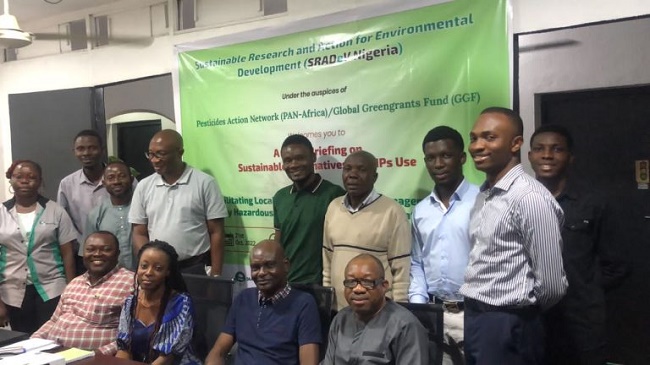The Sustainable Research and Action for Environmental Development(SRADev), an environmental NGO, has called for the regulation of the use of Highly Harzardous Pesticides (HHPs) in the country.

Executive Director of SRADev, Dr Leslie Adogame, stated this at a news conference on Sustainable Alternatives to Highly Harzardous Pesticides (HHPs) on Friday, October 21, 2022, in Lagos
Adogame said that the regulation of the use of HHPs had become necessary because of its indiscriminate use which leads to poisoning and death.
He said that, to stem the tide in the rise in the use of HHPs, there was the urgent need for the Federal Government, through the National Agency for Food and Drug Administration and Control (NAFDAC), to officially review or update pesticides/HHPs allowed into the country.
According to him, NAFDAC owes Nigerians a duty to publicly release the list of restricted/ banned HHPs in Nigeria.
He urged the National Environmental Standards and Regulations Enforcement Agency (NESREA) to immediately gazette/roll-out the “Hazardous Pesticides Chemicals Regulation” finalised by stakeholders two years ago.
“The Federal Ministry of Agriculture should immediately finalise the ‘National Organic Agriculture Policy for Nigeria’ which has been formulated since 2019.
“The recent pronouncement by the African Union in the development of organic agriculture in the continent should be implemented on national and local level.
“Nigeria Government should facilitate the access to certification services.
“There is no government approved certifying body yet to standardize products and ensure compliance with organic production system.
“Awareness or advocacy on organic agriculture must be raised to de-emphasise conventional Agricultural practices.
“Organic agriculture should be inculcated into the educational curriculum,” Adogame said.
The executive director noted that the national consumption of pesticides was on the increase.
He attributed the increase to the expansion of the business of four corporations from the Global North that control 70 per cent of the global pesticide market to the Global South where pesticides are less strictly regulated.
He said that countries like Nigeria are increasingly at the receiving end, adding that national goals of biodiversity conservation could only be achieved if the use of pesticides is significantly reduced.
Adogame said that studies show that Glyphosate, Paraquat Dichloride, Dichlorvos (DDVP otherwise called Otapiapia), Chlorpyrifos are categorised as dangerous HHPs.
He, however, said that these products that have been banned in many countries were still found highly imported into Nigeria and registered for use in Agriculture.
“In the years between 2015-2019, about 822 pesticides were registered in Nigeria by NAFDAC, of which 515, about 63 per cent, are classified as HHPs.
“China had the largest share of 50 per cent, 244 in the origin of HHPs, followed by India 128.
“Between 2020 and 2021, Glyphosate, a kind of organo-phosphorus compound, holds the highest share of all imported HHPs (Glyphosate accounts for a 67.4 per cent and 53.4 per cent of HHP imports in kilograms and litres respectively.
He noted that available data showed that the majority of imported and/or registered pesticides in Nigeria are highly hazardous.
Adogame said that. between 2020 and 2021, the cost of the HHPs imported into Nigeria amounted to over ₦75 billion, adding that imports from China and India alone accounted for over 97 per cent of the cost of HHP imports.
He said that alternatives to HHPs use in agriculture such as agro-ecology, organic farming was currently well advanced in many African countries, but less emphasised or promoted in Nigeria.
He explained that less attention to organic farming in Nigeria was because the existing and enabling policy frameworks were insufficient and not specific enough to support the growth of organic or ecological farming in Nigeria.
“Nigeria has no comprehensive policies in place to fund, implement or promote research as well as the practice into organic farming, agro-ecology or any other sustainable agricultural strategy.
“Regulations remain out of step with standards in leading export markets such as the EU.
“Enforcement of existing regulation is poor and alternatives to high pesticide use are unexplored
“Finally, Standards & Certification of organic food products are not in place to encourage export and competitiveness in the growing international market,” Adogame said.
He added that the need for organic Agriculture Standard was imperative.
